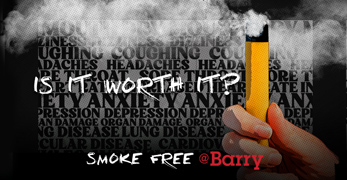Dean of Students
The Office of the Dean of Students serves as a resource to the entire University community through its efforts to meet the educational and developmental needs of students related to community standards, conflict management and resolution, civility, and respect for self and others.
Members of the campus community must act out of mutual respect to establish an atmosphere of trust.
Therefore, Barry University expects its members to treat one another with sensitivity, consideration, understanding, tolerance, and an active concern for the welfare of others.
Some of the services offered by the Office of the Dean of Students include advocating for all students, educational programs, faculty-student collaboration, conflict resolution, and the disciplinary process.
Associate Vice President & Dean of Students
Matthew R Cameron
Landon 303
305-899-3085
mcameron@barry.edu
Our mission is to provide support for the intellectual and personal development of all students – undergraduates, graduates, and adult learners – through a combination of advocacy, programming, and services that enhance the quality of campus life.
About our Office
-

Student Advocacy
Sometimes you might need a little extra help in navigating the departments of the University or with personal issues. Let the staff at the Dean of Students Office assist you.We encourage you to come by the office with any issues or concerns you may have. Our goal is to promote student learning and academic success. To assist you along the way, let us provide you with information and contacts for services and resources offered at Barry.No matter how big or small your question or concern is, we'll be happy to help. -

Disciplinary Process
As a Catholic and Dominican university, Barry stands for the dignity and worth of every person. We believe, therefore, in values that foster the human respect needed for people to live, work, study, and recreate together as a community. The student discipline system exists to handle violations of the University's rules and regulations. This system is based on a philosophy of fairness for all parties concerned in any situation involving non-compliance with a University policy or regulation. -

Educational Programs
Throughout the academic year, the office offers programs offering information on topics of importance to students. All students are urged to attend these programs. They are a good way to learn about and share solutions on issues that affect college students. Some of these issues include: alcohol awareness, drug awareness, sexual assault, domestic violence, time management, and personal safety. -

Complaint Process for out of State Distance Education Students
Out-of-state distance education students who have completed the internal institutional grievance process and the applicable state grievance process, may appeal non-instructional complaints to the FL‐SARA PRDEC Council. For additional information on the complaint process, please visit the FL‐SARA Complaint Process page. -

Faculty-Student Collaboration
Through the office, you have the opportunity to get involved in programs during which you will collaborate with faculty. Some of these programs include the Mentor Program, University committees, and community service opportunities. -

We Are Here To Serve You
The Office of the Dean of Students provides support for the intellectual and personal development of all students – undergraduate, graduate, and adult learners – through a combination of advocacy, programming, and services that enhance the quality of campus life.


























